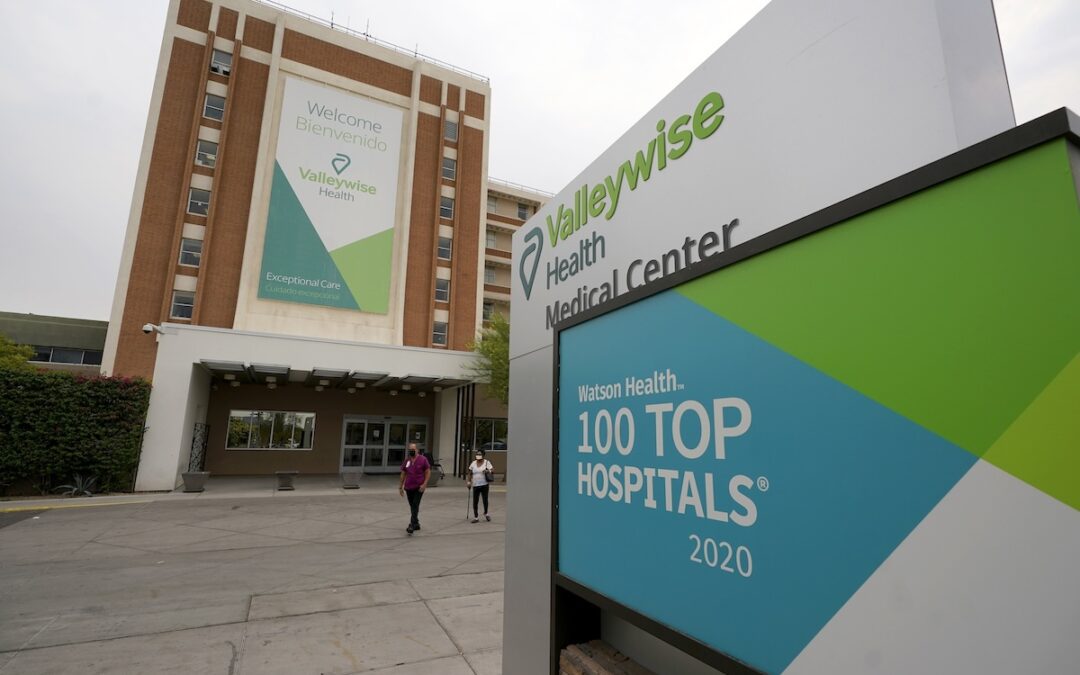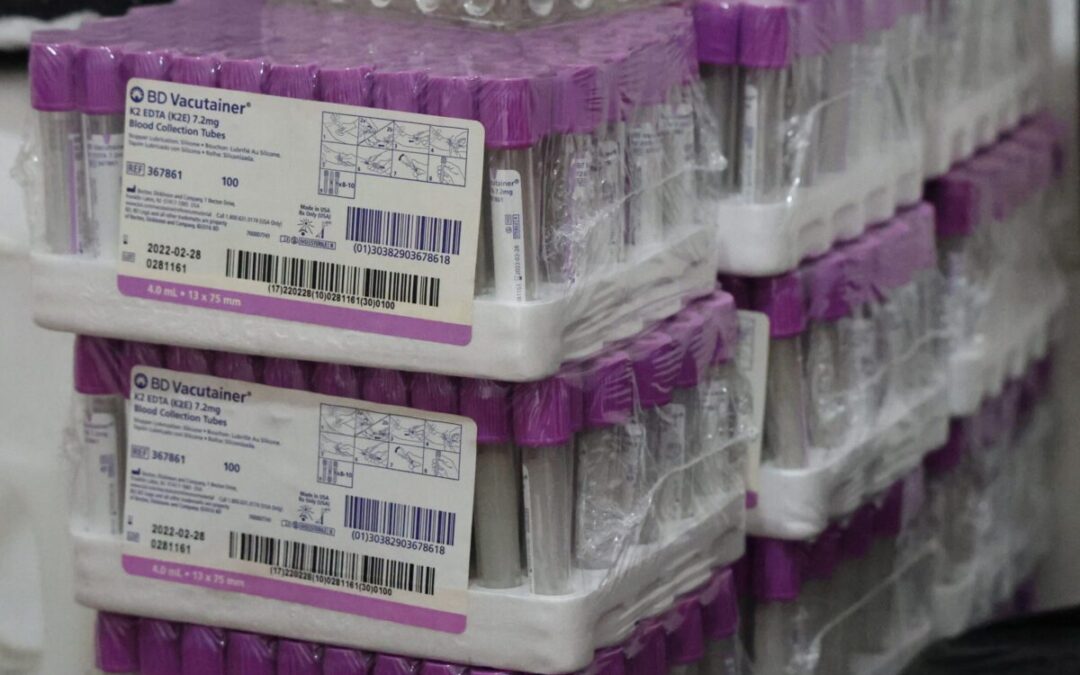
Fourth-grade students at Robison Elementary School in the Tucson Unified School District eat lunch on Feb. 5, 2025. Fresh produce is provided through a farm-to-school program. (USA TODAY Network)
A farmer cooperative based in McNeal, a small town in Arizona‘s southeast corner, is ramping up local food access, along with a pilot program with the Benson Hospital that takes a “food is medicine” approach.
The Local Co-op, a grower-operated food hub and grocery store, will work with the hospital to enroll 20 people with diet-related ailments and provide them with a weekly supply of locally grown produce for 90 days. The hospital will monitor key health data from the patients, such as blood pressure, sugar levels, and body mass index for analysis. The University of Arizona Cooperative Extension will provide nutritional education on-site.
The program is the vision of Local Co-op founder John Benedict, who self funded a similar pilot program for eight participants in March with a registered dietician and a physical therapist, dedicating nearly $5,000 over time in crops, wages and operating expenses. The larger goal: the Cochise Produce Rx Plan.
Want Arizona news in your inbox each morning? Sign up for our free newsletter.
Produce prescription is a health care approach that prescribes fruits and vegetables to patients with certain health conditions.
A nutritious diet is good for anyone, but food also plays an important role in preventing illness and can even reverse some chronic diseases like type 2 diabetes, hypertension and obesity. Other medical conditions that benefit from nutritional therapy are heart disease, strokes, osteoporosis and kidney disease, according to the Association of Nutrition and Food Service Professionals.
The model has existed for a long time. Six states already explicitly include produce prescription, or PRx, in their Medicaid programs. In Arizona, there are other pilot programs and ongoing research, but there is no policy in place.
If someone goes to the doctor with a diet-related ailment, the doctor could prescribe a diet with certain foods, just like they would prescribe pills, Benedict explained. The patient can then take that referral from the doctor and use vouchers at a local store to fill the order. The seller would get reimbursed through Medicare or AHCCCS, Arizona‘s Medicaid.
“The co-op, the farmers, would be the new food pharmacists,” he joked.
Benedict hopes the results from this pilot can lead to partnerships with Sierra Vista hospitals or rural clinics in Elfrida and eventually become accessible across the county.
“I see every day how much of our well-being comes down to what we eat and how we incorporate movement into our lives,” said Veronika Jollivette, who administered the first in-house pilot and provided online marketing. She is excited that nurturing program is now moving to Benson Hospital to include more people.
A call from lived experience, customer contact
Benedict was struggling before he grew and sold organic produce at farmers’ markets, founded the Local Co-op in 2023, launched a mobile market initiative and pitcched PRx programs to local hospitals.
Before securing a cheap piece of land in south Cochise County, which would later become the start of his organic farm, Desert Sky Produce, he was down to $500 and had been living in a tent and a van for nearly two years, he said, re-selling products out of a warehouse lot and “barely eking out a living.”
Escaping city life back east, he drove west until he got to Willcox, and later, McNeal.
“It was the first time I ever had to humble myself and go into a food bank,” Benedict recalls. At the food bank, he met people who would become his friends, mentors and, eventually, customers.
MORE: As SNAP cuts loom, this nonprofit aims to fill the gap in Arizona
In a whirlwind of life-changing events, he learned to farm, began growing food, organized growers to open a retail space and began serving the community with a variety of food-related programs. With a grant from the local food purchasing agreement program, ending next year, he created a Community Supported Agriculture model for a local rehab center in the spring of 2023. The surplus of that grant became the seed to begin a CSA program for residents across the county, run from the Local Co-op retail store and pickup locations.
Eventually, in October 2023, the Local Co-op got a grant to sell local produce to food banks.
“In like four years, I went from being the guy in line getting served at that food bank to then the guy farming for those same food banks, which was like really, really crazy,” Benedict said.
By 2024, the co-op gained traction. Members invested in the building, brought new farmers and ranchers in, and started working with more partners across the county.
Then came the Cochise Mobile Market, a retrofitted van the co-op purchased in January to “bring hyperlocal produce directly to each community,” said Jillian Werhowatz, operations manager at the co-op and owner of Likha’s Veggies. With it, they connect residents with the farmers “who grow and harvest nutrient dense food just minutes away.”
The van takes fresh produce where it is not available close by and is growing its list of stops, including the Benson Hospital.
“Food access has always been the bread and butter for the co-op because like personally, I saw what those food banks did for me,” Benedict said. “Not only the food, but you know, that sense of community, meeting people, having a routine every week, things that keep you honest.”
While many sources of funding have been cut for small producers and food hubs, he sees promise in programs that will keep running regardless of federal dollars, or are supported by the Local Co-op, like the produce prescription programs, the mobile market and a growing farm-to-school program across Cochise County.
Today, the co-op is serving seven school districts, and will add two more by the end of the month, he said. The districts have pledged to dedicate 10% of their food procurement budget to local foods, even if there isn’t reimbursement from the federally funded program. The U.S. Department of Agriculture announced a new grant program of $18 million on Sept. 10.
Benedict hopes more people will get behind produce prescription, an investment in long-term community health that aligns with calls to “Make America Healthy Again,” and can also support agricultural economies.
“I self-funded it because I couldn’t get anybody to give me a nickel anyway,” he said. “I would have loved to have more funding and this not be so difficult and have a bigger impact.”
‘Food is medicine’ could grow in Arizona
Produce prescription programs increase access to nutritious food for people who are food insecure, and have been applied in different ways across the United States.
Although Arizona has no established PRx program through Medicaid, many health programs follow a “food is medicine” approach or have tried produce prescription pilot programs.
Indian Health Services awarded $500,000 each to several tribes or tribal organizations across the country in 2023 so they could implement produce prescription programs in their communities. These included the Pascua Yaqui Tribe and the Navajo Health Foundation.
In Douglas, dozens of participants receive custom produce boxes from The Local Co-op after the Arizona Community Health Workers Association, or AzCHOW, applied last year to the Gus Schumacher Nutrition Incentive Program.
At the University of Arizona, Melanie Hingle, a nutrition scientist and public health researcher, has been leading a grant research program from the National Institutes of Health to analyze the impact of a medically tailored grocery program in the Tucson community. This model provides groceries on top of produce, including items like cooking oil, grains, tuna and spices.
Working with El Rio Community Health Center, the research team enrolled 60 patients and designed prescription food boxes to treat diabetes. The produce was delivered weekly for six months and was sourced by Pivot Produce, a Tucson nonprofit that buys produce from member farmers from the Local Co-op as well. This Friday is the last food box pickup.
“The impact on diabetes and on health care utilization, people’s personal finance and their perceived quality of health and life, that’s all going to be analyzed in the next month or two,” Hingle said.
There is ample evidence that produce prescriptions can alleviate food insecurity and improve diet quality, but the impact on health outcomes is less clear because these programs, and the way they are measured, vary across the country, she added.
“Comparability is a challenge,” Hingle explained. Comparing, for example, the different outcomes for people participating or not participating in the program, isn’t practical or ethical. They don’t want to withhold potential care.
“We always ensure that people who are interested in participating in these ‘food is medicine’ programs receive food. No matter what,” she added. In this research and care program, they tackled that challenge by creating a waitlist, so some people didn’t start right away but eventually received the program.
Hingle believes there are other metrics researchers could use to evaluate all kinds of programs. Electronic health records can hint at whether patients are changing their interaction with the health system: how often they fill prescriptions, if they have fewer emergency room visits and more preventive care visits.
“It’s a view that could be looked at across all kinds of program types,” she said, “because those data are very consistent on the back end.”
Arizona Health Care Cost Containment System, the state’s Medicaid agency, doesn’t cover produce prescriptions yet. Coverage, tailored to the state’s need, can also be modified every five years through changes to section 1115 waivers. Benedict advocated with food system workers and nonprofits to include produce prescriptions in this year’s waiver revision, but couldn’t find anyone to get behind that effort, he said.
The state agency recently concluded a series of public listening sessions to gather feedback on both existing programs and potential future initiatives that may be included in the renewal request, a spokesperson said. They couldn’t confirm if any provider asked for PRx or medically tailored groceries programs.
“It is still early in the process,” the spokesperson said, “and no final decisions have been made regarding which programs will be included.”
Clara Migoya covers agriculture and water issues for The Arizona Republic and azcentral. Send tips or questions to clara.migoya@arizonarepublic.com.
This article originally appeared on Arizona Republic: Arizona farmers’ co-op works with hospitals, clinics to ‘prescribe’ fresh produce
Reporting by Clara Migoya, Arizona Republic / Arizona Republic

Medicaid cuts to bring major shifts to Arizona’s healthcare system
President Donald Trump’s “One Big Beautiful Bill Act,” which all of Arizona’s Republican congressmen voted to pass, will result in an estimated...

How to tell if someone needs help in extreme heat—and what to do
This story was first published in The Copper Courier’s daily newsletter. Sign up here. It's another hot summer in Arizona. More than 400 people are...

She voted for Trump in 2016. Now, his threat of hospital closures puts her & her grandkids at risk
After Trump signed his "One Big Beautiful Bill," millions of Americans are at risk of being cut from Medicaid, and those cuts could result in rural...

Cuts in federal funding could slow efforts to end HIV in Arizona
PHOENIX – Ending the spread of HIV in Arizona may become more difficult if federal funding is cut or eliminated. Phoenix is one of many cities that...




